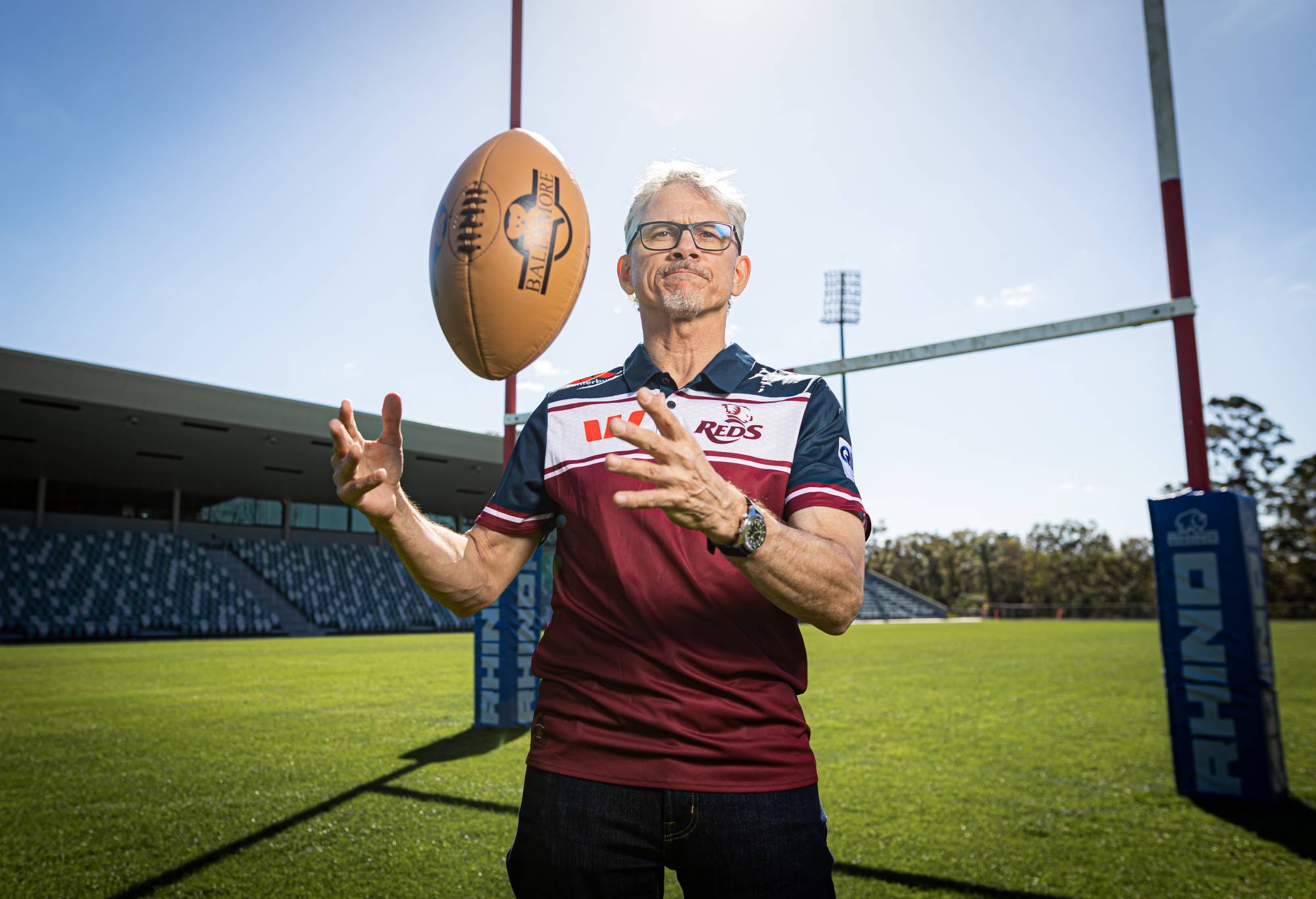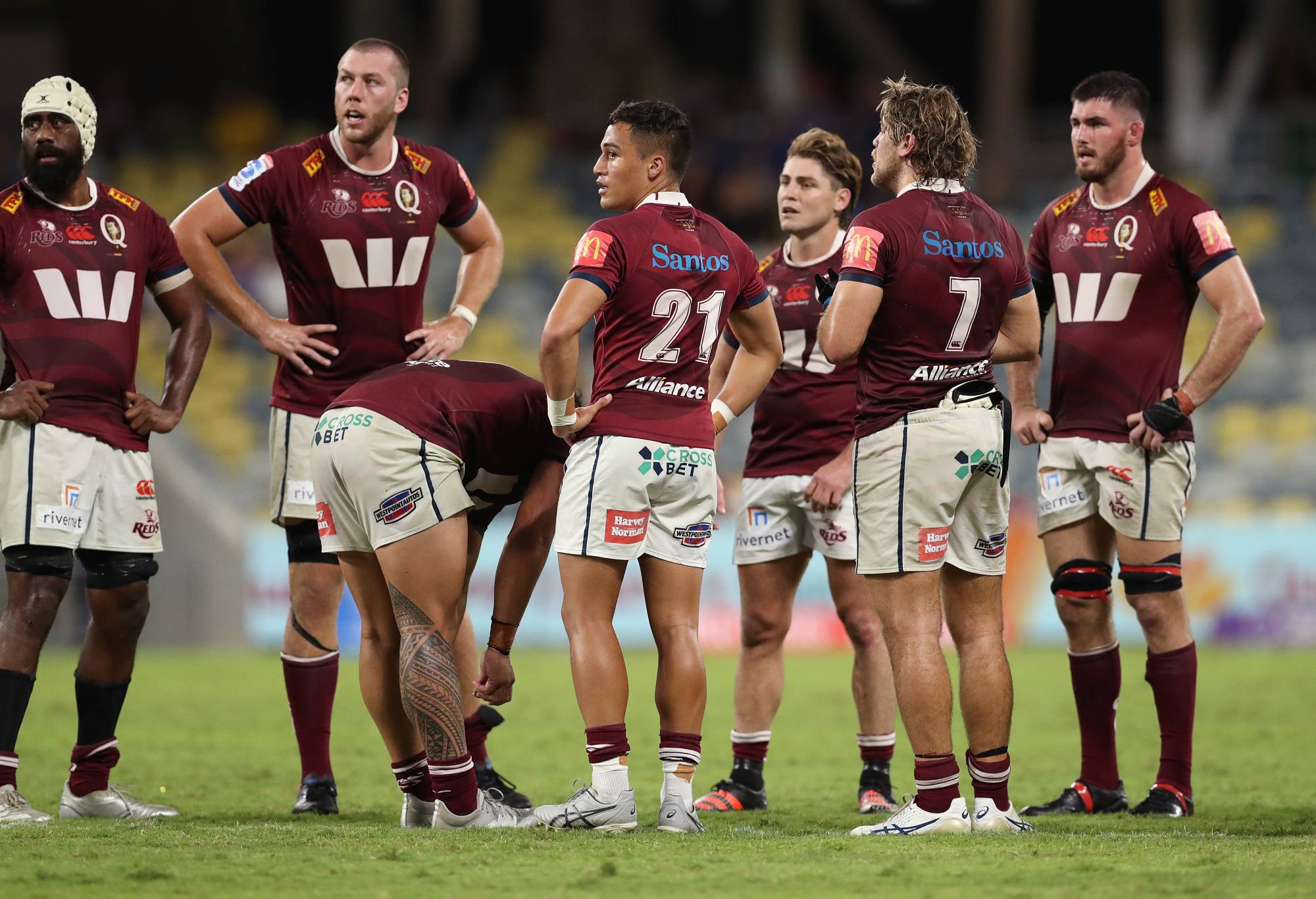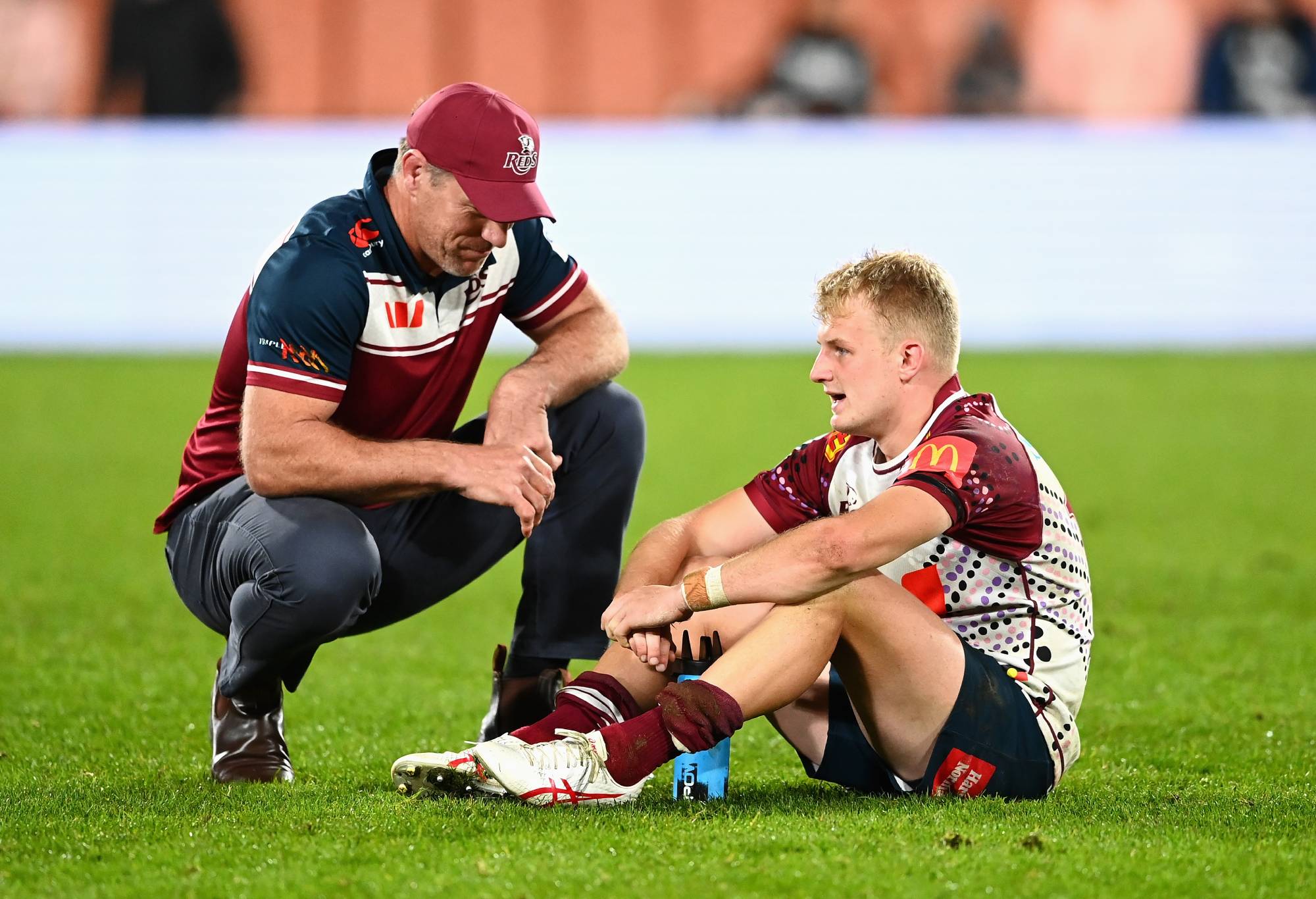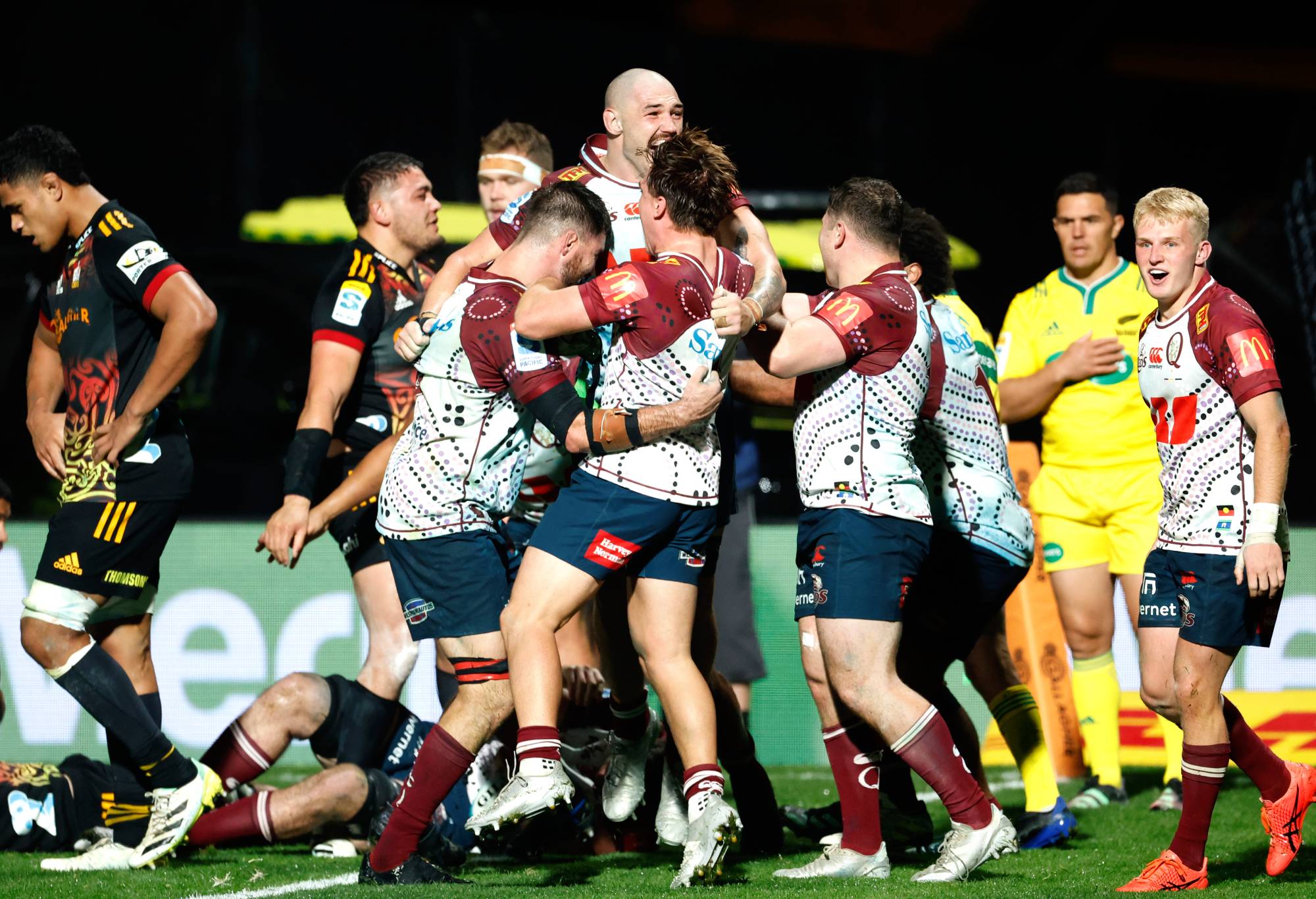There is a lot riding on the Les Kiss era for Queensland, both for the state and the man himself.
His journey back to Queensland has been a long one, encompassing codes and continents, almost as long as the Reds journey to recovery following the years of instability after their famous 2011 title.
On paper, it is a perfect match. Kiss, a coach who has built himself up over 26 years from many successes and failures, inheriting a Reds side with as many peaks and troughs in their history.

Queensland Reds coach Les Kiss. (Photo by Brendan Hertel, QRU)
But the challenges Kiss faces are issues he has tried (and failed) to address at previous clubs before, which begs the question: is Kiss able to break many issues that have seemingly presented themselves at the Reds? Equally so, will the Reds be receptive to his experience? They should be.
Making the transition from league over to union in 2001 as an assistant coach for the Springboks, Kiss quickly developed a knack for crafting strong defense, a skill galvanised as assistant coach at the Tahs where he took them to their first ever grand final in 2005 and again in 2008. This proved a vital stepping stone to further success back in Europe, where, as defence coach of Ireland, he would be instrumental in three Six Nations titles and a Grand Slam.
His strength in constructing resolute defence made him a rising star of the game, and one of Queensland’s most underappreciated rugby exports, in both codes. Considering the list, that was saying something. However, his transition into the head coach space was far from smooth.
Despite moments of positivity, like making the PRO12 semi-finals in 2015-16, his stint as Director of Rugby (and interim head coach) at Ulster ended with what has come to be known as the “basket case” season of 2017-18, which saw coach Jono Gibbes depart after just one season, multiple player controversies and a poor run of form.
Kiss departed before the season was out. It was a ship he couldn’t turn around, a club filled with issues that needed change. The club has subsequently undergone a rebuild under current coach Dan McFarland.
It felt eerily similar to the underperforming Reds following Ewen McKenzie’s departure, as Richard Graham, Matt O’Connor and Nick Stiles couldn’t yield the results on the field. Fortunately for Kiss, it proved to be a lesson well-learned, as his next stint as head coach of London Irish proved much more successful.

Reds look dejected at full time during the round 11 Super Rugby Pacific match between Queensland Reds and NSW Waratahs at Queensland Country Bank Stadium, on May 06, 2023, in Townsville, Australia. (Photo by Kelly Defina/Getty Images)
Winning the RFU Championship in his first year and promoting the club back to the Gallagher Premiership, Kiss’ shift of focus to strong fundamentals came into its own in the subsequent years, improving on every season, with 2023’s fifth placed finish the highest the club had achieved in 15 years. Throw in two Premiership Cup runner up positions and a knack for nurturing future England talent through the academy, and it seemed like Kiss had finally found his footing, addressing key holes in his coaching strategies.
That is, until London Irish went into administration in May 2023. But for Queensland, it was the perfect timing.
The Reds have undergone a significant transformation during the time of Kiss’ predecessor, Brad Thorn. After so many years of underperformance, financial strain and more, the decision to hand over the keys to Thorn was a risky one – his previous coaching experience having been leading Queensland Country to the 2017 NRC title.
But, it was also a reflection of where Queensland needed to go. While the Reds had underperformed, their effective management of the two NRC sides in Brisbane City and Queensland Country had seen the Sunshine State develop stronger depth than their other Australian counterparts, depth that Thorn had worked with personally and could get results from.
It resulted in a Super Rugby AU title in 2021, in front of the largest crowds the Reds had seen since the 2011 Grand Final. The celebrations continued for two straight days, so long in fact that it coincided with their preparation for Super Rugby Trans-Tasman. They crashed back to earth in their first game against the Highlanders, losing 40-19.
It must have been a good party, because the hangover persisted. While Aussie sides would struggle against the Reds in Super Rugby Pacific, nowhere was the contrast more stark than the Reds’ record against Kiwi sides, with only two wins (both against the Chiefs) recorded between the 2021 Trans-Tasman season and the end of the 2023 season.
Many factors played a role, with the blooding of especially young players in playmaker roles like Tom Lynagh and Lawson Creighton having drawbacks on several occasions, outclassed by more experienced opposition.

Reds coach Brad Thorn and Tom Lynagh of the Reds during the Super Rugby Pacific Quarter Final match between Chiefs and Reds at FMG Stadium Waikato in Hamilton, New Zealand. (Photo by Hannah Peters/Getty Images)
But, issues seemed to go deeper. Stories of major players not being on board with the coaching style started to emerge, with Reds playmaker Quade Cooper being removed from the squad entirely and gun prop Taniela Tupou also making the decision to leave the club.
Whether players would reveal their displeasure with Thorn or not, it was clear that all was not well through the work rate of many Reds players in 2023, evidenced through examples like issues at scrum time (second worst in the competition for scrum wins), to their ability to read and surprise defensive structures (fifth worst for defenders beaten). Many Reds struggled to also translate through to the Wallabies, with the work rates of Jordan Petaia and Suliasi Vunivalu being frequently found out.
In short, it suggested one of two things: a lack of trust in the coach, and/or a sizable number of players who were not totally on board with systems, whether it be for professional reasons, moral disagreements around how to play the game, or a clash of egos.
By mid 2023, it felt like Thorn had taken the Reds as far as he could, and while his achievements were nothing short of phenomenal and the club was in an infinitely better place under his stewardship, it was clear a new change was needed. Enter Kiss.
From their first match against Panasonic, Kiss’ Reds look to be a more patient side. Early pressure from Panasonic and combinations from the new blood took time to gel, but there was a lot to like from their 31-29 win.
Kiss brings many tools with him the Reds can improve upon immediately: strong defensive structures, a key focus on fundamental parts of the game, and plenty of coaching experience from all parts of the globe – something Thorn the coach hasn’t had the chance to develop yet.
The Reds also give Kiss plenty of depth, something he has taken full advantage of after spending time out in the Queensland system and signing great talent in the form of Harry McLaughlin-Phillips from Souths and the U20s program, Frankie Goldsbrough in the centres and Tim Ryan in the back three, among several more.
Kiss has also been quick to recognise that the forward pack is where Queensland lack the most depth, and has rectified the loss of Tupou and Harry Hoopert brilliantly with the signing of experienced heads Alex Hodgman from the Blues and Jeffery Toomaga-Allen from Ulster.

The Reds celebrate after winning the round 12 Super Rugby Pacific match between Chiefs and Queensland Reds at Yarrow Stadium, on May 12, 2023, in New Plymouth, New Zealand. (Photo by Andy Jackson/Getty Images)
He’s also identified that the locks are also where the Reds lack depth following the departures of Luke Jones and Lopeti Faifua, bringing in the likes of Randwick stalwart Cormac Daly and Sunnybank’s Taine Roiri to support Angus Blyth, Ryan Smith and Connor Vest.
When you look at the Queensland side, there are options galore. Young, exciting talent who have spent several years at Super Rugby level, ready to blossom under the right coach. Kiss has the skillset and the mindset to make this Queensland side step up to the level Thorn couldn’t. On paper, it is a perfect match.
But, on paper is not where a rugby game is decided. Whether the squad can accept buy-in of Kiss’ strategies is another question entirely. Whether he can get the work rate out of them when the going gets tough won’t be answered until the season begins.
Similar to Ulster, Kiss comes to a franchise ready and ripe for success, but with culture questions still to be answered. Old habits from the Thorn era may die hard, but if Kiss can shake the habits of the past he’ll find plenty of happy hunting back in Brisbane.
































































































